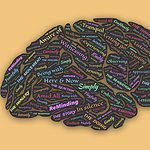The Curse of the Hamster Wheel of Knowledge – Why Becoming a Real Expert Is Very Difficult

A fascinating and, let's be honest, an inseparable part of human nature is attributing to oneself mainly positive qualities, i.e. egocentric bias.
Egocentric bias - a tendency to explain the consequences of one's own behavior in such a way as to increase positive and reduce negative significance for one's self-esteem.
And maybe I am slightly prejudiced because of my interest in memory, but it seems to me that nowhere else is it as visible as in the work we do.
How many times have you met a doctor, IT specialist, or even a chef who said he was average or mediocre? That's right. It doesn't happen often.
The truth is, there are very few real experts. Not that people are lazy or lacking in intelligence.
All because of the phenomenon I call ... * sinister background music *
THE CURSE OF THE HAMSTER WHEEL OF KNOWLEDGE
What is the curse of the hamster wheel of knowledge?
Before proceeding to clarify the nature of the curse itself, it is worth starting with a reminder of what the Pareto principle is.
The Pareto principle

Photo by Austin Distel on Unsplash
The Pareto principle says that statistically, in many areas of life, 20% of the potential causes are associated with 80% of the results.
This does not mean, of course, that the ratio is always 20/80. Sometimes it will be 10/90 or 30/70.
The most important conclusion, however, is that most often a relatively small group of variables will be responsible for most of the results.
How does this relate to the work we do?
The Pareto principle for work
By transposing the above rule onto professional soil, it is not difficult to notice that in any profession there are a limited number of tasks or problems that will dominate the workload.
Knowledge Pyramid
The next step that will help you understand the curse of the hamster wheel of knowledge is to look at the knowledge pyramid.




Although it is sometimes criticized for lack of precision, this pyramid still shows one important thing: active learning, such as performing activities, guarantees much more effective assimilation of information.
In other words, the information we don't use very quickly fades from our minds.
What's more, the more abstract the information is, the faster we forget it.
Final explanation of the curse of the hamster wheel of knowledge
Summarizing the above, we can say that:
- 1A limited number of problems and tasks fill most of the time in any profession.
- 2Unused knowledge (especially abstract) quickly leaves our minds.
And this is the curse of the hamster wheel of knowledge.
Most of us have no idea how to retain a great deal of knowledge in our mind, and thus it is quickly forgotten. At the same time, we do not have to suffer undue consequences for this. The lesser amount of knowledge we have and use is able to address the tasks we face, through repetition caused by the Pareto principle.
Thus, most people are at a level of competence that guarantees no one will kick them in the ass, making them a corporate piñata.
But make no mistake about it - it is the so-called survivable level of competence, which is self-sustaining at most.
However, it is no indicator of sophistication or highly specialized knowledge.
An example of a hamster wheel of knowledge - building muscle mass




Initially, I wanted to Google relevant articles or statistics for this section. However, I found that it would be easier to just relate an anecdote from my own life, which for some reason stuck in my mind.
It was relatively easy for me to notice it because I obsessively remember absolutely everything in every field that interests me, in particular anything related to medicine, nutrition and physiology.
A good friend of mine, during one of our conversations, mentioned that he is considering testosterone supplementation because he is not particularly pleased with the growth rate of his muscle mass.
The training and nutrition plan that he got from his trainer with 15 years of experience can be called a classic.
Lift 3 times a week for power to hit every muscle group 2-3 times, eat 5 meals a day, and ingest a ton of strange supplements that if they had an effect, it was definitely a placebo.
After looking at the whole thing, it turned out that:
I could go on and on about what else could be done, but I think the above is enough to highlight the following thought:
the moment when you think you know enough is the moment when you condemn yourself to mediocrity.
To become a real expert, you need to constantly expand your knowledge.
Let's discuss the simple ways you can do it.
How to fight the curse of the hamster wheel of knowledge




Photo by David Clode on Unsplash
Don't worry. We are not talking about smearing your face with bat guano or sticking dill into your colon during the new moon. I mean, it will certainly not hurt, but it won't be that useful.
The following approach is needed here:
1. Have a system
99% of the people I've ever talked to have absolutely no systematic way of acquiring knowledge.
Most often they work on the principle of throwing wet paper at the wall. If you read or listen to information enough, something will probably stick.
If you give yourself 20 years to be decent in your field of choice, then the above solution is completely rational.
However, if you want to do it much faster, create your own learning system.
By the learning system I mean a fixed way of acquiring new information.
The one I usually recommend is simply downloading a review optimization program (e.g. ANKI) and entering the information you want to remember.
2. Don't stop learning
It doesn't matter how much you already know. It's always worth assuming that you still don't know enough. If you already study regularly, you should not have special problems with this.
If you have trouble with regularity, you can always set an overarching rule that you must stick to every day.
It can be, for example, learning 3 new facts a day.
3. Create a knowledge map
I say it repeatedly: one of the biggest challenges in science is to be aware of what we don't know as accurately as possible.
Although this sounds abstract, it is perfectly logical. Until you know that there is knowledge that you have not yet acquired, you will not be able to access it in any way, nor will you be able to even consider using it to solve a problem.
A good example is an IT specialist who has learned to program in a given language at an intermediate level and has been using the same commands over and over again to solve various kinds of problems.
Although this knowledge level is often sufficient to solve the problem, it is neither optimal nor efficient.
So your goal is to create a long-term knowledge map, i.e. a list of things you need to learn. You can do this even by browsing through appropriate textbooks or courses and systematically acquiring encountered knowledge.
Have you noticed any signs of the hamster wheel of knowledge curse in your immediate surroundings? Let me know in the comments!
Done reading? Time to learn!
Reading articles online is a great way to expand your knowledge. However, the sad thing is that after barely 1 day, we tend to forget most of the things we have read.
I am on the mission to change it. I have created over 13 flashcards that you can download to truly learn information from this article. It’s enough to download ANKI, and you’re good to go. This way, you will be able to speed up your learning in a more impactful way.











Hello Bartosz. How are you?
First of all, I want to thank you for all the teaching you provide for free. I read your page since 2018. I think I read all the articles but I’m not sure. Thanks to you I redesigned my entire learning strategy. Not only do I use it to learn English but I mostly use it to learn about birds. I am an ornithologist and I work as a guide in South America. We have about 3000 species and each one has an average of 4 different types of songs, some up to 7.
Using your advice, ANKI, and reading all the books you mention, I’ve managed to get the info into my head without much pain. Of course, I still miss a lot of sounds on Amazonian Forest but I’m definitely better than before.
Now I’m going to tell you what I think about THE CURSE OF THE HAMSTER WHEEL OF KNOWLEDGE. Reading books I found that dopamine is not the hormone of pleasure but the hormone of exploration. Dopamine release occurs in the planning stage and only shortly after starting the task.
And I started to think about why this happened. And I associate it directly with the Pareto 80/20 rule. It makes perfect sense that we seek to learn things because we are curious about an area of knowledge. That causes you to release dopamine and generate positive feedback.
But what happens after?
I mean what happens after you managed to learn the most common 20% of the info. That’s when your brain starts seeing “repeat, repeat, repeat” and starts to release less dopamine. You stop releasing dopamine because you stop discovering things. Obviously, if you keep looking you will find new information. But that is not obvious to everyone. It wasn’t obvious to me until I read Anders Ericson’s Peaks.
I realized this by looking at the level of wisdom in my local Birding WhatsApp group. We are 70 but only 4 of us are at what I could call “expert level”. The others remain at the intermediate level. And something that caught my attention is that none of them are newbies. THERE ARE NO BEGINNERS.
So I think that the energetic engine that makes you go from beginner to intermediate is that desire to learn and explore. Especially in an activity like Bird Watching, this is true because you really go to mountains and lagoons looking for new birds.
But dopamine stops motivating you to improve when you reach the intermediate level. If you want to continue improving you have to have another engine. Perhaps ambition is a good engine. Or that you need to work on it.
The reptilian brain definitely stops feeling like you’re exploring when all the info it sees is repeated. So you have 2 options: continue in the same activity but with a different engine (ambition is good) or change activities (yoga, climbing, chemistry) and continue using dopamine that will push you to improve until you reach 20%.
Best regards. Please keep writing these great articles. Thanks to you I saved 20 years of study through passive repetition.
Excellent article! It is fascinating where people draw the line on information as it relates to so many things. I think more information is always better, especially in the game of information acquisition and retention. My focus primarily now is the acquisition of psychological information and knowledge and I do understand the value of both retaining what one learns and having that knowledge accessible to use it consciously. In our earlier communications this is what I meant went I talked about “prep”. In your example with your friend that was aiming to do body building, he had not outline some very core things (that a certain kind of expert would have immediately assessed). I think with language learning as well, there are certain assessments that must be made INIITIALLY before the journey begins to “mow down the lawn of information” before diving in with low testosterone levels 😀
Thank you, Marcus! The power of “prep” is indisputable. I am delighted that you have helped me realize that I can do it better! More information is USUALLY better. There are definitely kinds of information that one can simply look up. In that case, it’s a waste of time to fill up your memory with it. However, for lots of disciplines, including psychology, remembering and understanding lots of facts is undoubtedly extremely important!